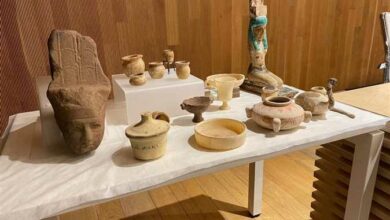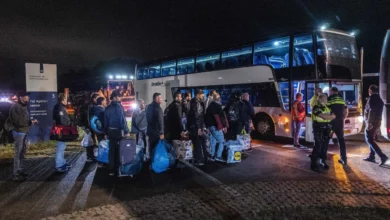Integration Crisis
In the wake of Thilo Sarrazin’s bestselling book, “Germany Abolishes Itself,” which hit the market in August 2009, many polls indicate that the majority of Germans believe their Islamic immigrant guests have outworn their welcome and should pack up their cultural luggage and leave the country.
“Most Germans entirely disagree with a recent statement by President Christian Wulff that Islam belongs to Germany,” Prof. Detlef Pollack of the University of Muenster said.
A poll conducted by the Social Democratic Party’s (SPD) Friedrich Ebert Foundation revealed that 58 percent of West Germans and 75 percent of Germans in the eastern states believe that “religious practices for Muslims should be seriously curtailed.”
In an official publication entitled “Summary: Muslim Life in Germany,” the German Federal Ministry of Immigration notes that “the majority of Muslims are religious. Overall, 36 percent would describe themselves as very religious. Fifty percent claim to be rather religious. Religiosity is particularly evident among Muslims of Turkish descent and Muslims of African origin.”
The fact that the Arab community is now expanding as a result of the overflow of illegal immigration worsened the already exacerbated situation. Many incoming immigrants face a steep challenge finding employment as they must often be overqualified in order to compete with their German counterparts. As illegal citizens, they are not allowed to learn German in public schools and can not afford private schools. After some time, they get residence permits, for example, as refugees, but they will still be non-German speakers and be unable to integrate into society.
The German share in the crisis
The lack of integration, however, cannot be blamed solely on the immigrant community in Germany as the issue also hinges on the local German and Western peoples who often treat Arabs, who are just different in features and culture, as aliens or non-Germans. “Very often, Germans asked me how I speak German so fluently, I answer, 'Because I was born in Germany and studied in German schools.' Their answer is 'aha… that is why,'” said Haidi, an Egyptian born in Germany. Haidi shared how Germans’ first impression of her when she starts talking is that she is not German because she does not look like Westerners; on this basis they are surprised that an Arab girl speaks German like a native speaker.
Haidi was also asked frequently by Germans why she wears a hijab and if she is oppressed as a result. “Hijab just covers my head, not my mind” she answers.
The big difference between Arab and European cultures was a barrier towards achieving any kind of integration in society. Most Arabs and Turks are Muslims who are sticking to performing rituals. Europeans define the term of being religious as “extremist.” However, there are religious Christians and Jews, but the connection between Islam and extremism was closer due to terrorist attacks being launched by extremists claiming to be Muslims. Such stereotypes were circulated after the September 11 events. Such anti-Islamic views led Muslims to stick more to rituals and in turn widen the gap of disintegration.
Therefore, the distance between both sides grew. Arabs who do not separate between religious rituals and culture and Germans to whom separation bewtween rituals and culture is obvious cannot accept the fact that there are different types of like-minded Muslims similar to Westerners. These Muslims, however, are not highlighted in the media which focuses on jihadists who adopt acts of violence and Salafists attempting to revive strict Muslim doctrines dating back to the era of the 6th century Prophet Muhammad.
A German of Tunisian origin, Seif bin Ahmad, 19, who just completed high school in Germany, went through some problems when he was young. His classmates with rightist affiliations treated him as a non-German, driving him to look for Arab friends with the same culture as his own.
Seif said that the Germans he lived with were "cold" and that Arab immigrants and local Germans had few ties between them. He believed that this lack of relations between the two communities is due to politics and media "fanning the flames of Islamohpobia" and creating an atmosphere of distrust.
Arab immigration to Germany began in earnest during the 1970s in response to a labor shortage prompted by economic recovery in Germany. Turkish immigrants, however, made it to Germany earlier in the 1950s. Some statistics estimate Arabs in Germany to be roughly 38,000 and others to one million. Turkish immigrants are estimated to be at 2.5 million, but there are many more unregistered.
The Arab community in Germany is mostly comprised of Palestinians, Lebanese, Jordanian, Syrians and North Africans, including Algerians, Moroccans, Tunisians and Egyptians. The majority of these immigrants come from poverty or war-torn societies in the Arab region.
According to a report by the International Organization for Migration (IOM), the difference between Egyptian immigrants in Europe and other nationalities is that Egyptian migration is mainly male-dominated and temporary in general, while Maghreb and Sub-Saharan Africa migration streams are dominated by males and females who intend to stay in the destination countries.
Despite the gloomy picture of Arabs and Turks in German society, there are good examples of Arabs who contributed to the progress of society and who excelled. For example, engineer Hany Helmy Awez immigrated to Germany in the 1970s and studied civil engineering there. Hany was in charge of building the main railway station (Berlin Central Station) in Berlin on 26 May 2006. The station is considered the largest crossing station in Europe.




